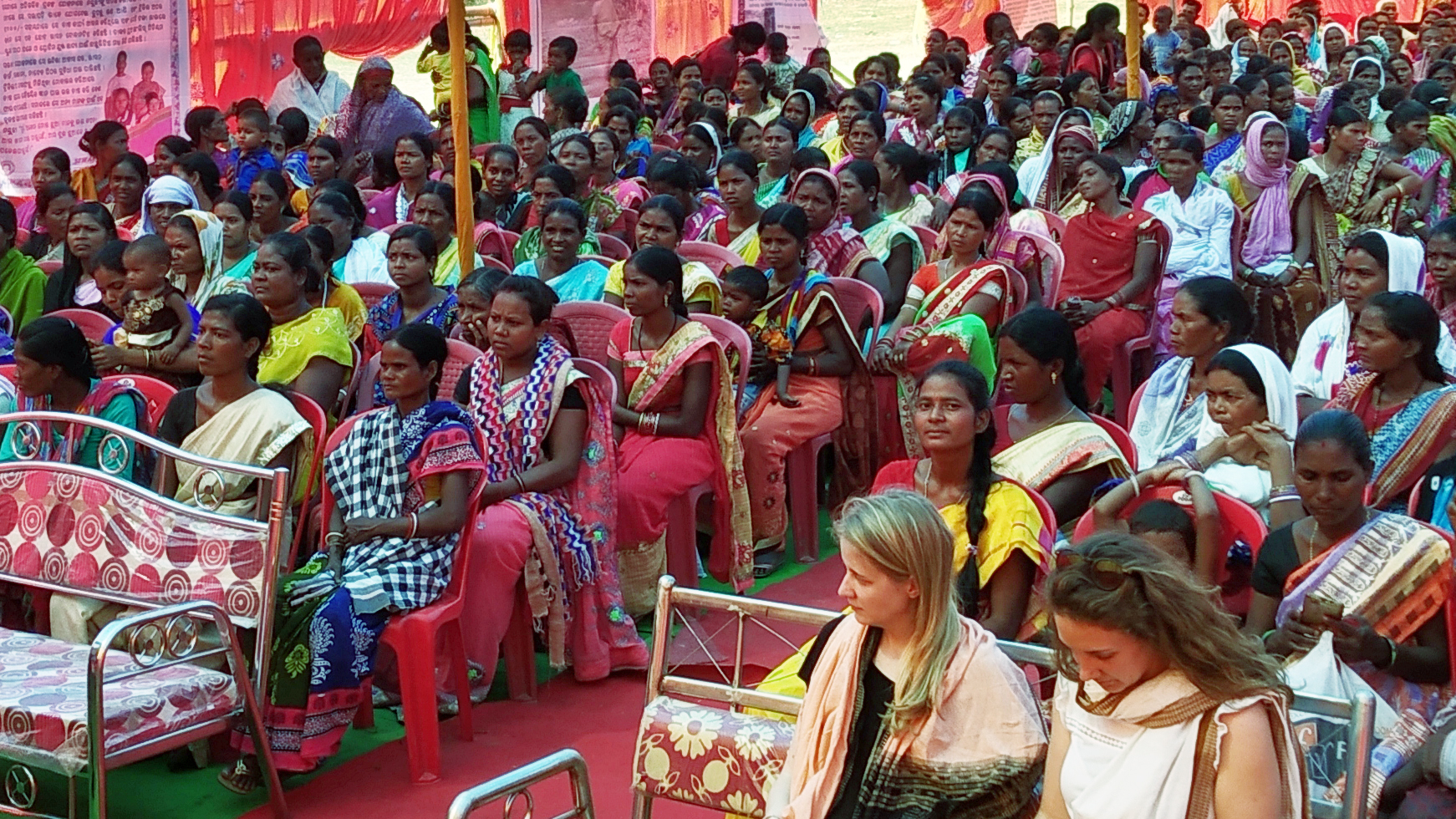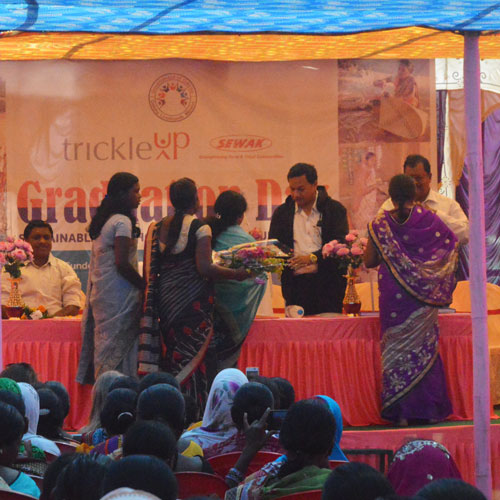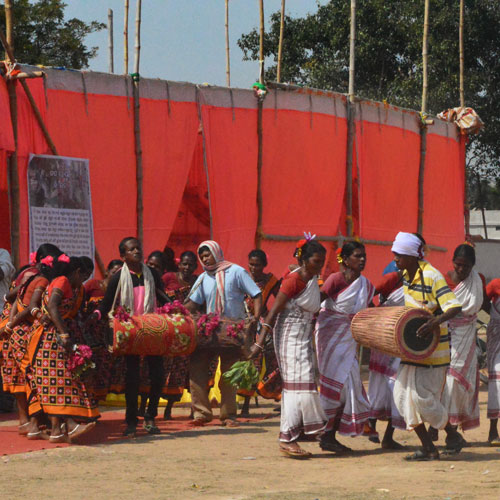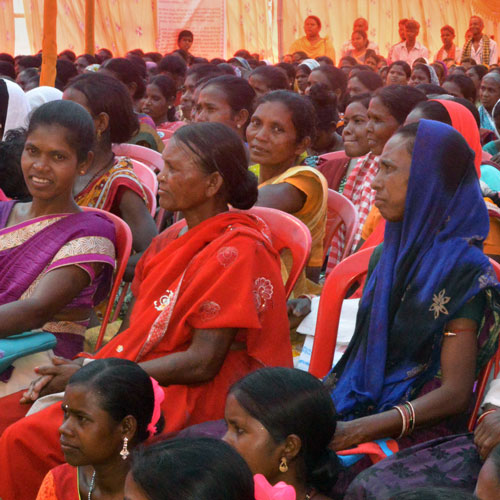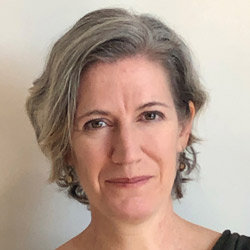In February, 500 women gathered in Balisankara, Odisha, to celebrate their graduation from Trickle Up’s first full program cohort in partnership with the Odisha Livelihoods Mission (OLM). This event celebrated an important milestone in our program participants’ journeys out of poverty. It also signified a new stage for Trickle Up’s deepening work integrating the Graduation Approach into large government anti-poverty programs in India, and in doing so, enhancing the inclusion of ultrapoor women in such programs.
The graduation ceremony was more than just a celebration- it was a showcase of the women’s achievements in forging a sustainable pathway out of poverty. Women who were previously marginalized and voiceless even in their own communities were now able to share their experiences with 150 attendees, including heads of government departments, Trickle Up staff, and staff of our local partner, SEWAK. Additionally, media outlets covered the ceremony.
The ceremony also helped to cement future commitments from key stakeholders, both towards launching new programs and continuing support for the graduating women. It also provided a valuable opportunity for staff to reflect on and update our concept of what it means to “graduate” when programs are integrated into government schemes.
Next Steps for Graduates
A concern faced by many programs is how to provide ongoing support after a program ends, and what to do for those who do not make sufficient progress during the project period. Self-help groups (SHGs), as the name implies, are expected to provide some such support, and every program participant in India – even those who didn’t graduate within the time period – is now a member of a government recognized SHG, which is a prerequisite for accessing many further services.
At this Graduation ceremony, government staff presented information to the women about programs and services to which they are entitled. A representative of the government’s National Horticulture Mission shared information about its services and subsidies, including access to fruit trees, seeds, drip irrigation systems, and cold storage facilities. The Balisankara block veterinary officer presented available opportunities to support goat farming. Raising awareness of these and similar programs among participants is important for ensuring continued government support after the Trickle Up program ends. SHGs are also a vehicle for applying collective pressure on local officials to provide access to services.
OLM’s District Officer publicly stated during the ceremony that his office will take on the responsibility for follow-up with participants and SHGs, drawing on their cadre of community resource people. Trickle Up staff are now preparing a detailed list for OLM of the participants who did not graduate – on average, about 80% of project households “graduate” within the three year project timeframe. This list includes the reasons why they didn’t graduate, and what extra support is required to enable them to reach the goal of full economic and social inclusion.
Redefining Graduation in India
Graduation has always involved achieving a significant level of economic and food security and social integration. However, there has been debate within the community of Graduation practitioners about what it means beyond that:
Is it necessary that participants become completely self-reliant?
How does this relate to the obligations of a government to its most vulnerable people?
Answers to these questions are context specific. Following the Graduation Ceremony, we updated our definition of what it means to “graduate” in India to better reflect the context of integration into government programs (and revised some key performance targets to better reflect this definition). This involved taking into account the services and support that the government has committed to continue to provide to program participants, through the process of integration. This is what we drafted:
A participant/household has graduated when they have sufficient economic and social resources, linkages to schemes, and skills and awareness to be able to be reasonably resilient to shocks and to be able to have a good likelihood of being able to maintain and continue their trajectory out of poverty. It is not assumed that all participants will have surpassed the poverty line at the time of graduation, but their progress and active membership in SHGs is expected to enable them to take full advantage of the government schemes that can be availed to support continued livelihood development and social and financial inclusion.
This new definition provides greater clarity about how leveraged resources, such as future assets and services for livelihood investment, will allow participants to continue on a viable trajectory out of poverty. This enables us to be more strategic and cost-effective about what inputs are required through the Graduation program itself – and what is not needed – to enable participants to get to the stage of being able to access more mainstreamed services. Conceptualizing Graduation as one step, albeit a critical one for the ultrapoor, on a pathway out of poverty also helps illustrate the immense potential and importance of integrating the Graduation approach into large scale government programs, despite all the complexities of doing so.

